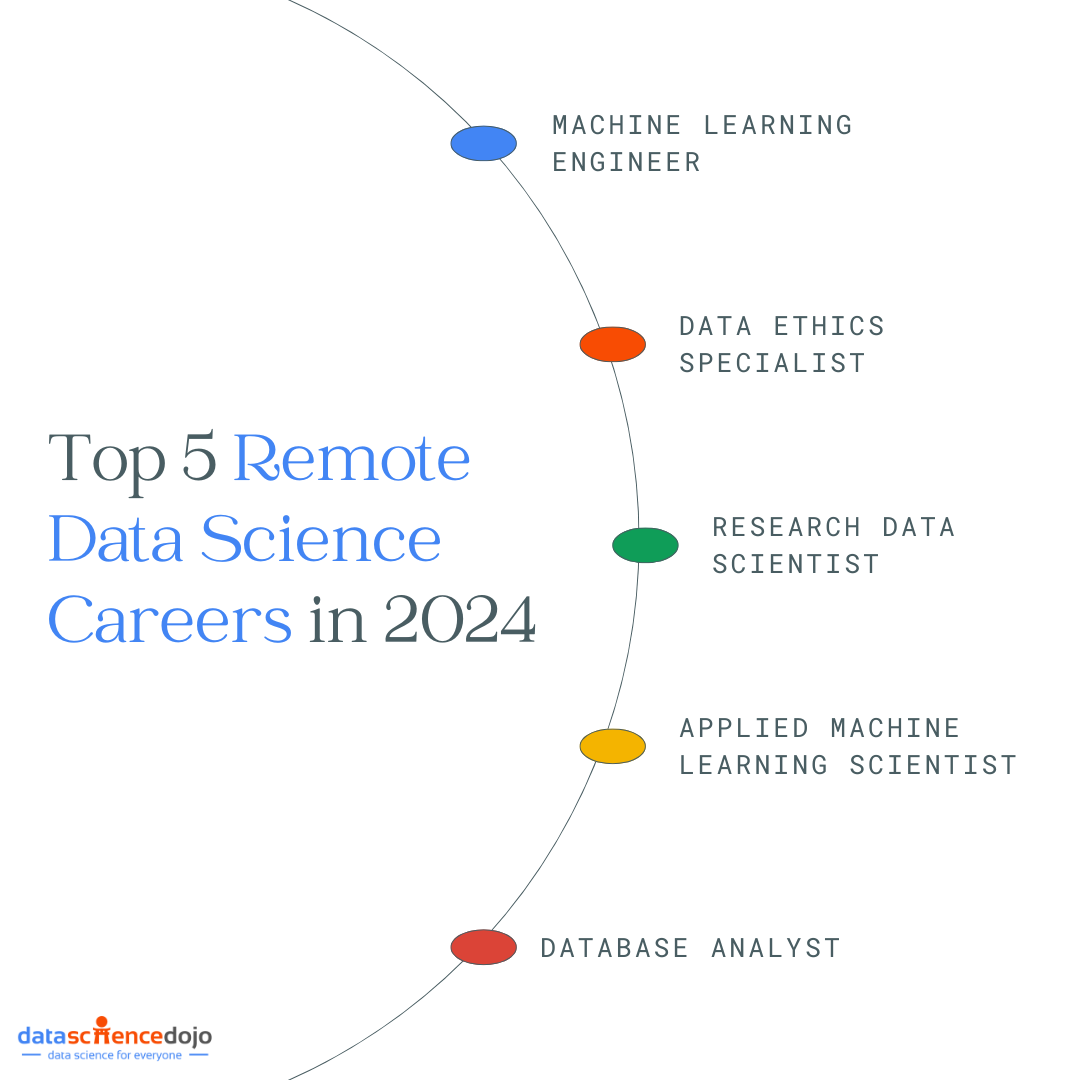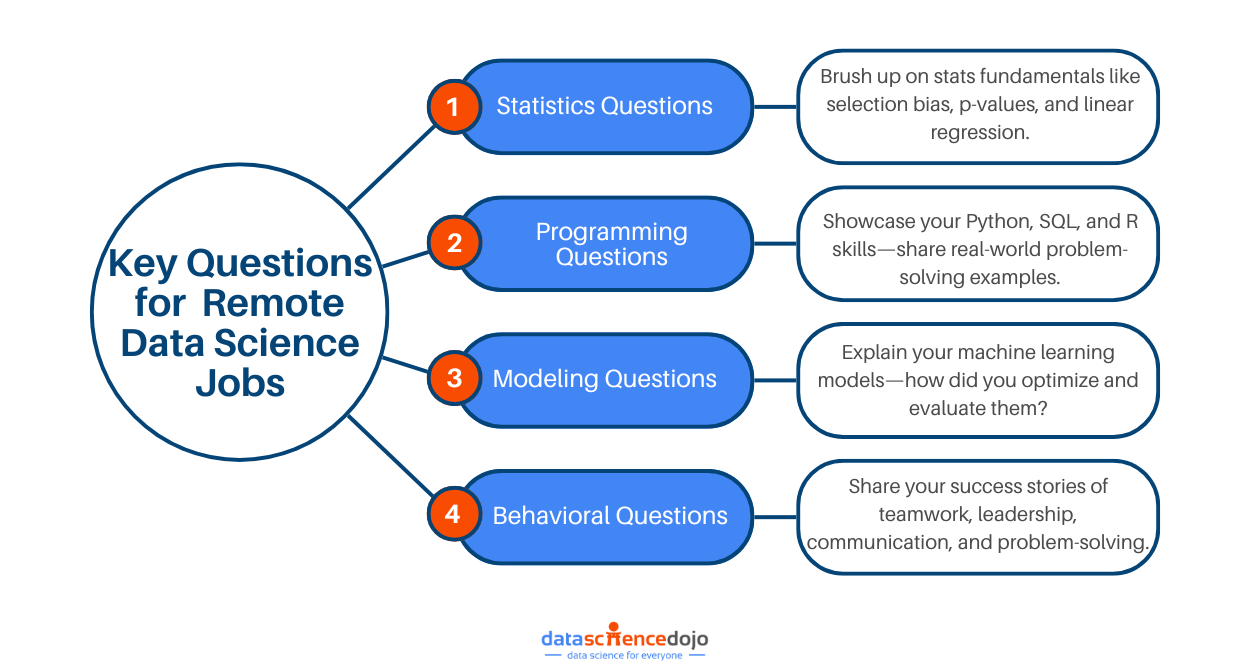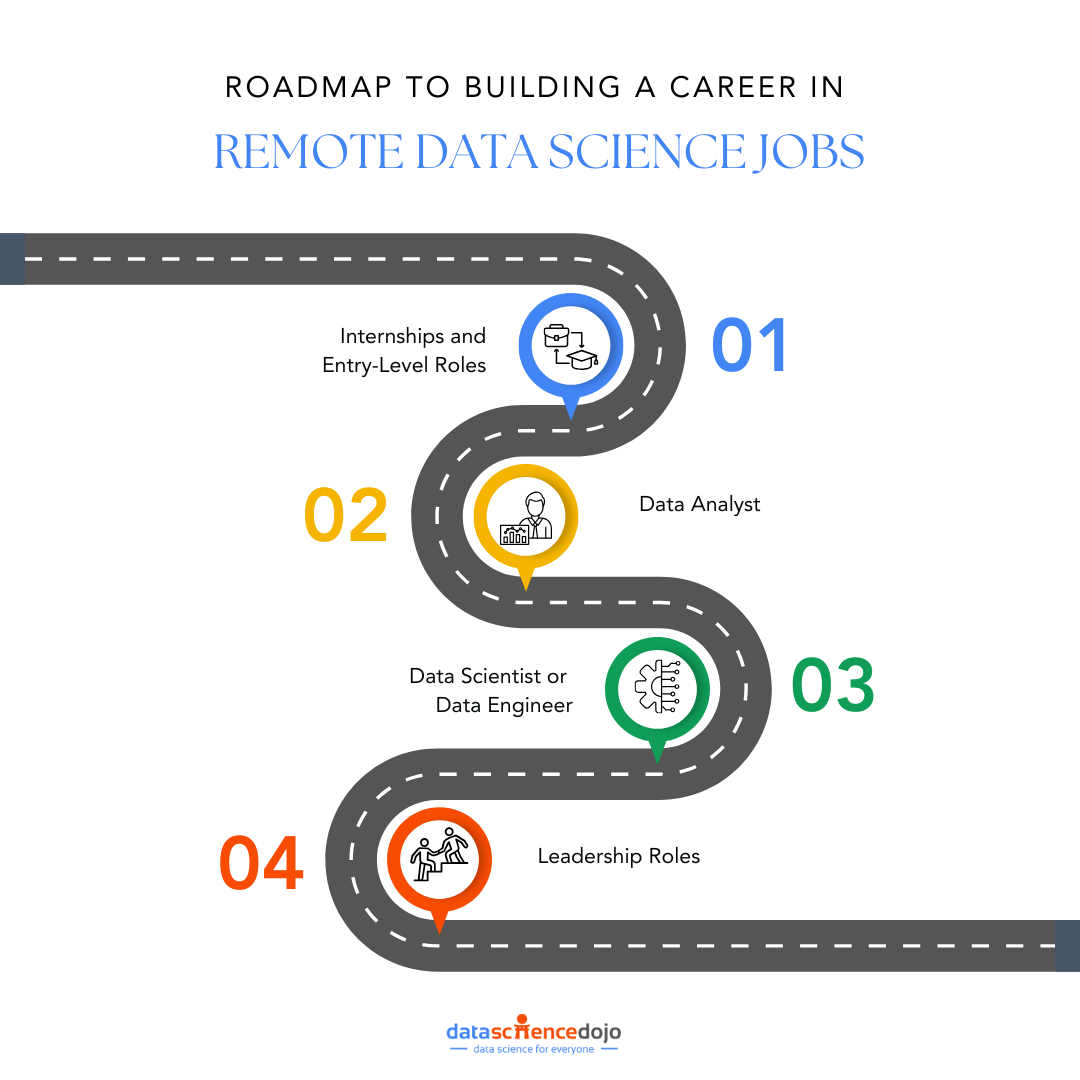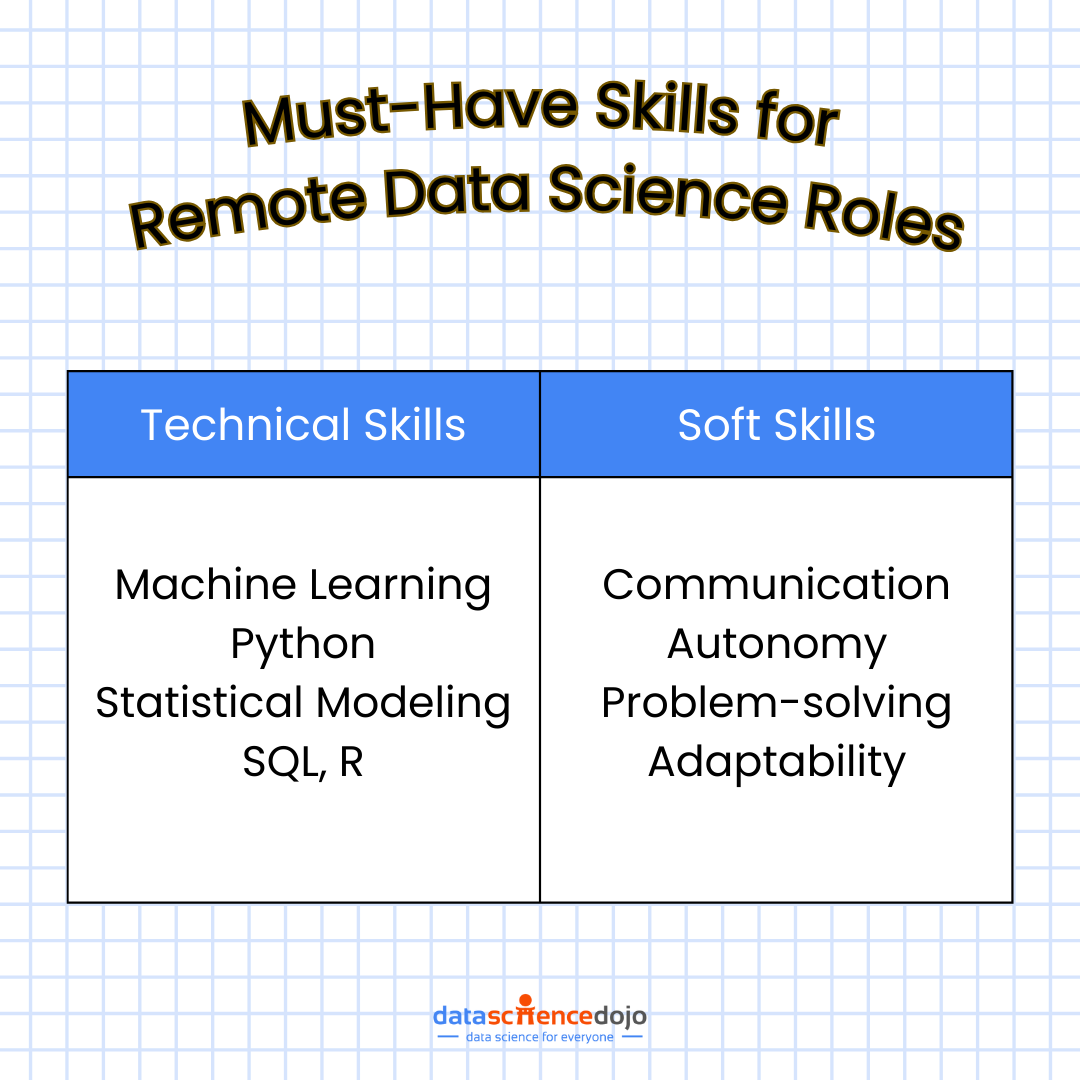Imagine a world where bustling offices went quiet, and the daily commute faded away. When COVID-19 hit, this became a reality, pushing remote work from a perk to a necessity. In fields like data science, which are inherently digital, this transition was seamless, opening up a global market for remote opportunities.
According to the U.S. Bureau of Labor Statistics, data scientist roles are projected to grow 36% from 2023 to 2033—one of the fastest growth rates across all industries. Additionally, Gartner reports that nearly half of employers now support full-time remote work, underscoring a broader shift in the workforce.
This guide covers what you need to thrive in a remote data science career, from must-have skills to strategies for standing out in the global job market.
How Are Remote Data Science Jobs Different?
Remote data science jobs may appear similar to in-office roles on the surface, but the way they’re structured, managed, and executed varies significantly. Here’s what sets remote roles apart:
1. Self-Management and Autonomy
According to research from Stanford University’s Virtual Human Interaction Lab, remote data scientists must operate with high levels of autonomy. Unlike in-person roles with on-the-spot guidance, they are expected to independently manage complex projects, often across different time zones.
This requires a well-honed ability to prioritize tasks, meet deadlines, and stay productive in independent or unsupervised settings. Stanford recommends using structured routines or “sprints,” breaking the day into focused work blocks for data science jobs to enhance productivity.
2. Specialized Industry Knowledge
The University of California, Berkeley notes that remote data scientists often work with clients across diverse industries. Whether it’s finance, healthcare, or tech, each sector has unique data requirements.
For instance, Berkeley’s Division of Data Science and Information points out that entry-level remote data science jobs in healthcare involve skills in NLP for patient and genomic data analysis, whereas finance leans more on skills in risk modeling and quantitative analysis. By building industry-specific skills, you’ll be well-equipped to meet the niche needs of your job.
Learn about data science applications in the e-commerce industry
3. Advanced Digital Collaboration
Collaboration in remote data science jobs relies heavily on digital tools. According to a study by McKinsey & Company, companies cloud-based platforms like Databricks or JupyterHub, and project management tools like Asana to keep workflows smooth and organized.
Platforms like Miro and Figma help remote teams collaborate visually and interactively, especially during brainstorming sessions or when developing data-driven projects.
In-Demand Remote Data Science Jobs and Roles

Top universities and industry leaders highlight the following roles as high-growth areas in remote data science jobs. Here’s what each role entails, along with the unique skills that will set you apart.
1. Research Data Scientist
Research Data Scientists are responsible for creating and testing experimental models and algorithms. According to Google AI, they work on projects that may not have immediate commercial applications but push the boundaries of AI research.
Key Skills: Mastery of machine learning frameworks like PyTorch or TensorFlow is essential, along with a solid foundation in unsupervised learning methods. Stanford AI Lab recommends proficiency in deep learning, especially if working in experimental or cutting-edge areas.
Growth Outlook: Companies like Google DeepMind, NASA’s Jet Propulsion Lab, and IBM Research actively seek research data scientists for their teams. Their salaries typically range from $120,000 to $180,000. With the continuous growth in AI, demand for remote data science jobs is set to rise.
Explore different machine learning algorithms for data science
2. Applied Machine Learning Scientist
Applied ML Scientists focus on translating algorithms into scalable, real-world applications. The Alan Turing Institute emphasizes that these scientists work closely with engineering teams to fine-tune models for commercial use.
Tools and Key Skills: Expertise in deploying models via Kubernetes, Docker, and Apache Spark is highly valuable, enabling the smooth scaling of applications. Advanced knowledge of these deployment frameworks can make your profile stand out in interviews with remote-first employers.
Top Employers: Amazon, Tesla, and IBM all rely on machine learning scientists for applications like recommendation systems, autonomous technologies, and predictive modeling. Demand for applied ML scientists remains high, as more companies focus on AI-driven solutions for scalability.
3. Data Ethics Specialist
A growing field, data ethics focuses on the responsible and transparent use of AI and data. Specialists in this role help organizations ensure compliance with regulations and ethical standards. The Yale Interdisciplinary Center for Bioethics describes this position as one that examines bias, privacy, and responsible AI use.
Skills and Training: Familiarity with ethical frameworks like the IEEE’s Ethically Aligned Design, combined with strong analytical and compliance skills, is essential. Harvard’s Data Science Initiative recommends certifications or courses on responsible AI, as these enhance credibility in this field.
Top Employers: Microsoft, Facebook, and consulting firms like Accenture are actively hiring in this field of remote data science jobs, with salaries generally ranging from $95,000 to $140,000. For more on job growth and trends in data science, visit the U.S. Bureau of Labor Statistics.
Learn more about ethics in research
4. Database Analyst
Database Analysts focus on managing, analyzing, and optimizing data to support decision-making processes within an organization. They work closely with database administrators to ensure data integrity, develop reporting tools, and conduct thorough analyses to inform business strategies. Their role is to explore the underlying data structures and how to leverage them for insights.
Key Skills: Proficiency in SQL and experience with data visualization tools like Tableau or Power BI are essential. Strong analytical skills, large dataset handling, and familiarity with data modeling and ETL processes are also key, along with knowledge of Python or R for advanced analytics.
Read more about data visualization in healthcare using Tableau
Growth Outlook: With the increasing reliance on data-driven decision-making, the demand for Database Analysts and entry-level remote data science jobs is expected to grow. The rise of big data technologies and the need for data governance further enhance the growth prospects in this field.
5. Machine Learning Engineer
Machine Learning Engineers are responsible for designing, building, and deploying machine learning models that enable organizations to make data-driven decisions. They work closely with data scientists to translate prototypes into scalable production systems, ensuring that machine learning algorithms operate efficiently in real-world environments.
Key Skills: Proficiency in Python, Java, or C++ is essential, alongside a strong understanding of ML frameworks like TensorFlow or PyTorch. Familiarity with data preprocessing, feature engineering, and model evaluation techniques is crucial. Additionally, knowledge of cloud platforms (AWS, Google Cloud) and experience with deployment tools (Docker, Kubernetes) are highly valuable.
Growth Outlook: The demand for Machine Learning Engineers continues to rise as more companies integrate AI into their operations. As AI technologies advance and new applications emerge, the need for skilled engineers in this domain is expected to grow significantly.
Common Interview Questions for Remote Data Science Jobs
The interview process for remote data science jobs includes a mix of technical and behavioral questions to assess your skills and suitability for a virtual work environment.
Below is a guide to the types of questions you can expect when interviewing for remote data science jobs, with tips on preparing to excel, whether you’re pursuing entry-level remote data science jobs or more advanced roles.

1. Statistics Questions: In remote data science jobs, a strong understanding of foundational statistics is essential. Expect questions that evaluate your knowledge of key statistical concepts. Common topics include:
- Descriptive and Inferential Statistics
- Probability
- Statistical Bias and Errors
- Regression Techniques
Explore the key statistical distributions used in ML
2. Programming Questions: Programming skills are crucial in remote data science jobs, and interviewers will often ask about your familiarity with key languages and tools. In both advanced and entry-level data remote science jobs, these questions typically focus on Python, R, SQL, and coding challenges.
3. Modeling Questions: Modeling is a core aspect of many remote data science jobs, especially those focused on machine learning. Interviewers may explore your experience with building and deploying models in entry-level remote data science jobs or senior positions.
For this set of questions, interviewers test your understanding of ML techniques, model evaluation and optimization methods, and data visualization and interpretation skills.
4. Behavioral Questions: Behavioral questions in interviews of remote data science jobs help assess cultural fit, communication skills, and collaboration potential in a virtual workspace. In both entry-level remote data science jobs and advanced roles, these questions test your skills around:
- Teamwork and Collaboration
- Adaptability and Initiative
- Communication Skills
- Resilience and Problem-Solving
Pro-Tip: You can use the STAR method (Situation, Task, Action, Result) to structure your responses effectively in interviews.
Building a Remote Career in Data Science

Data science is a versatile and interdisciplinary field that aligns exceptionally well with remote work, offering opportunities in various industries like finance, healthcare, technology, and even fashion. Here’s what to focus on:
Internships and Entry-Level Remote Data Science Jobs
Internships provide hands-on experience and can fast-track you to full-time roles. They allow you to work on real-world problems and build a strong foundation. If you’re already employed, consider an internal move into a data-focused position, as many companies support team members who want to develop data skills.
Data science interviews typically begin with a technical exercise, where you’ll tackle coding challenges or a short data project. Be prepared to discuss practical examples, as hiring managers want to see how you apply your skills to solve real-world problems.
Read more about Interview questions for AI scientists here
Starting as a Data Analyst
If you’re new to data science or seeking entry-level remote data science jobs, a Data Analyst position is often the best starting point. Data analysts are crucial to any data-driven organization, focusing on tasks like cleaning and analyzing data, creating reports, and supporting business decision-making.
In remote data science jobs as a Data Analyst, you’ll typically work on:
- Data Exploration and Cleaning: organizing raw data to ensure data quality
- Reporting and Visualization: creating visuals using tools like Tableau, PowerBI, or Python libraries like Matplotlib and Seaborn
- Statistical Analysis: to gather data-driven insights for strategic business decisions
Specializing as a Data Scientist or Data Engineer
As you gain experience, you can specialize in remote data science jobs like Data Scientist or Data Engineer within remote data science jobs.
1. Data Scientist: In this role, you’ll focus on machine learning, predictive analytics, and statistical analysis. You’ll need a solid understanding of algorithms, feature engineering, and model evaluation. Depending on your team, you may also explore deep learning, NLP, and time series analysis.
Skills Needed: Python, R, SQL, and machine learning frameworks like Scikit-Learn or TensorFlow.
Explore more about NLP Applications
2. Data Engineer: Remote data science jobs as a Data Engineer involve building pipelines for data extraction, transformation, and loading (ETL), along with database management and optimization. The role requires expertise in SQL, big data tools (Hadoop, Spark), and data warehousing solutions like Redshift or BigQuery.
Advancing into Leadership Roles in Remote Data Science Jobs
Remote data science jobs offer opportunities to advance into leadership positions, where you can combine technical expertise with strategic insight.
Lead Data Scientist: As a Lead Data Scientist, you’ll guide a team of data scientists and analysts, ensuring projects align with business goals. This role requires strong technical skills and the ability to mentor remote teams.
Chief Data Officer (CDO): A CDO shapes data strategy and governance at the executive level. This high-level role in remote data science jobs demands technical knowledge, business acumen, and leadership abilities to drive innovation and growth.
To move into these leadership positions, focus on developing skills in project management, strategic planning, and communication, all key to influencing data strategies in remote data science jobs.
Key Skills for a Remote Data Science Job

Remote data science roles require a blend of technical and soft skills:
Technical Skills
Remote data science roles demand a combination of both technical and soft skills. On the technical side, proficiency in languages like Python, SQL, and R is essential, alongside a strong understanding of machine learning, algorithms, and statistical modeling. These are foundational skills that empower remote data scientists to analyze and interpret data effectively.
Soft Skills
In addition to technical expertise, soft skills are critical for success in remote roles. Effective communication, critical thinking, and adaptability enable data scientists to convey complex insights, collaborate with diverse teams, and work autonomously in a remote setting. Balancing these skills ensures a productive and successful career in remote data science.
Learn more about developing Soft Skills to elevate your Data Science Career
Internships or consulting projects are excellent ways to develop both technical and soft skills, giving you a chance to test the waters before committing to a fully remote role.
Expert Tips for Landing a Remote Data Science Jobs
If you’re ready to enter the remote data science job market, these advanced tips will help you get noticed and secure a role.
1. Join Virtual Competitions and Open-Source Projects: Working on open-source projects or participating in competitions on platforms like Kaggle and Zindi demonstrates your skills and initiative on a global stage. According to the Kaggle community, showcasing top projects or high-ranking competition entries can be a strong portfolio piece.
2. Pursue Specialized Certifications from Leading Institutions: Top universities, including MIT and Johns Hopkins, offer remote certifications in areas like NLP, computer vision, and ethical AI, available on platforms like Coursera and edX. Not only do these courses boost your credentials, but they also equip you with practical skills that many employers are looking for.
3. Network with Industry Professionals: Joining communities such as Data Science Central or participating in LinkedIn data science groups can provide valuable insights and networking opportunities. Many experts recommend actively participating in discussions, attending virtual events, and connecting with data science professionals to boost your visibility.
4. Consider Freelance Work or Remote Data Science Jobs and Internships: For those new to remote work, freelance platforms like Turing, Upwork, and Data Science Society can be a stepping stone into a full-time role. Starting with freelance or internship projects helps build experience and credibility while giving you a solid portfolio for future applications.
Top Online Programs to Prepare for Remote Data Science Jobs
If you’re considering online programs to enhance your qualifications for remote data science jobs, here are some excellent, flexible alternatives to formal degree programs, all suited for remote learning:
Data Science Bootcamp by Data Science Dojo: The Data Science Bootcamp by Data Science Dojo offers an intensive, hands-on learning experience designed to teach key data science skills. It covers everything from programming and data visualization to machine learning and model deployment, preparing participants for real-world data science roles.
IBM Data Science Professional Certificate (Coursera): A beginner-friendly program covering Python, data analysis, and machine learning, with hands-on projects using IBM tools. It provides practical skills using IBM tools, making it ideal for those starting in data science.
Microsoft Learn for Remote Data Science Jobs: Microsoft offers free, self-paced courses on topics like Azure Machine Learning, Python, and big data analytics. It’s ideal for learning tools and platforms widely used in professional data science roles.
Harvard’s Data Science Professional Certificate (edX): Provides a deep dive into data science fundamentals such as R programming, data visualization, and statistical modeling. It’s an academically rigorous option, suited for building essential skills and a data science foundation.
Google Data Analytics Professional Certificate (Coursera): A practical, career-oriented certificate covering tools like SQL, spreadsheets, and Tableau. It’s designed to build essential competencies for entry-level data analysis roles.
Conclusion
Remote data science roles offer significant opportunities for skilled professionals. By focusing on key skills and building a strong, relevant portfolio, you’ll be well-prepared to succeed remotely.
Looking for more entry-level tips and insights? Subscribe to our newsletter and join our Data Science Bootcamp to stay connected!






